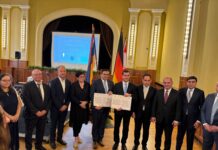VENICE — The first I met Antranik Zekian, an avid traveler and Armenian Diasporan activist, was in 2018 as a student of Venice Armenian Summer School, where he returns regularly with his partner, French-Australian Florence Micol and later also with their baby, Azad. Antranik or Anto, as his friends call him, was born in 1983 in France to an Armenian father and a French mother. He is an engineer by profession. He currently lives and works in Zurich, Switzerland and runs his own travel blog (https://www.lespassengers.com).
Our conversation concerns his travels and on maintaining Armenian identity in today’s world.
Dear Antranik, I always admire people with unusual biographies, especially when they are my compatriots. I was thrilled to learn about your around word travel and to see your photos in Antarctica. Could you please tell us about that trip?
After completing my engineering studies, I worked in the United States and then in the United Kingdom. I’ve always had a taste for adventure. After spending several years in the field of banking IT, I felt the need to explore the world with my own eyes. Some years earlier, I had done some bicycle touring and really enjoyed traveling on two wheels. So, it was quite natural for me to decide to embark on a world tour by motorcycle. Motorcycles, like bicycles, allow you to be in touch with the elements. When you travel on two wheels, you experience your journey with all your senses: you taste the dust of the trails, feel the rain droplets trickle down your neck, and shiver when it’s cold. You also connect more easily with locals, who wonder what you’re doing there.
I grew up in France, so I decided to start my journey at the Eiffel Tower. The trip was supposed to last a year, but it ended up spanning two and a half years, allowing me to cross 41 countries and cover over 91,000 kilometers overland. Traveling by road lets you witness the world change gradually. You focus more on what connects people rather than on what sets them apart. As you mentioned, I was fortunate to participate in an Antarctic expedition. Arriving in Ushuaia, at the southern tip of Patagonia, I thought I had reached the end of the world. Thanks to a few encounters, I was able to board a ship and spend two weeks on the white continent. It’s a unique experience: crossing Cape Horn with albatrosses trailing the ship’s wake, spotting the first distant icebergs, and then seeing penguins watching us on the horizon while humpback whales breach near our boat.
Observing nature in its wild state is a rare privilege. This passage through Antarctica also confronted me with a truth we often forget: we are tiny compared to nature’s elements. This becomes even more evident when you’re on a boat surrounded by icebergs, with the closest human presence 1,400 kilometers away.









